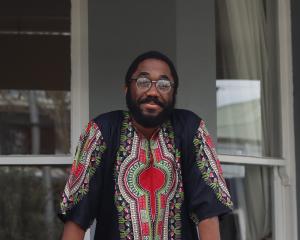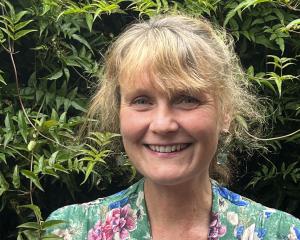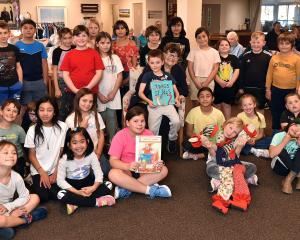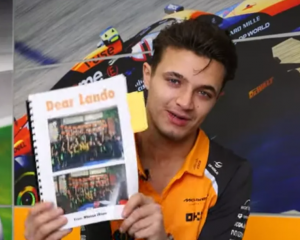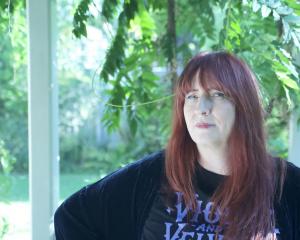The following is an edited transcript of Shane Gilchrist's interview with best-selling British author Ken Follett in Queenstown on Friday, December 3:
ODT: Having sold more than 100 million books (of which some have been made into films and television series), you are a wealthy man with annual earnings estimated at 10.6 million pounds -- there is even a statue of you in Spain-- yet here you are in New Zealand, a place not supremely vital to success of your latest book Fall of Giants; likewise, here you are talking to me, again something you didn't need to do.
Are you always so prepared to do such extensive "legwork" to promote your work and further your career?
Follett: "You're right... I always wanted to write stories that would enchant millions of people. And part of that process involves letting people know a book is out there. When I have finished writing a new book, I want to go there and say to people, 'my new book is out'.
"When I started I had a period of no success and I never forget that. I remember how I used to wish that people like you wanted to interview about my new book. You don't forget that; if you are sensible, you don't get too high and mighty about it.
"It works out to be about eight weeks a year on average [for promotional activities]. Now I'm launching a trilogy so, obviously, it merits even more than usual promotion. How we really sell books is by someone reading it, putting it down and saying to their best friends, 'you've got to read this great book'. But you've got to kick-start that process."
ODT: Do you find it stimulating to get feedback from your readers and others?
Follett: "Getting reaction from my readers is important. Sometimes they will say something negative, and that is interesting, too. One of the most common criticisms from readers is from women who'd prefer I skip over the violence . . . that's makes me think. But on the other hand, if the hero is in danger, then there needs to be some realistic pain."
ODT: A recent "Observer" article lamented the size/scale of many recent books, yet your most popular works -eg The Pillars Of The Earth and sequel World Without End - are lengthy. Are you satisfying a reader demand?
Follett: Some say they wish it were longer. I think also, in a longer book, you see a character develop from, say, childhood to adulthood, or from maturity to old age and that's very satisfying to the reader. They enjoy that process, that rhythm of human life.
"A regular-sized novel, about 100,000 words is a snapshot of the characters at some point in their lives. Usually at a time of great crisis. Usually, the story takes place over a few days or weeks or months, maybe a year or two, but doesn't give you that biography factor.
ODT: Was there an element of a self-imposed challenge in turning your hand to epics? Why, for instance, go from 1986 spy thriller "Lie Down With Lions" to "The Pillars of the Earth"? What prompted such a change?
Follett: "Well, I thought there was a great popular novel to be written about the building of a cathedral. I thought that idea could be turned into something much better than I had written before. The other thing about that is, I never really felt boxed in by my previous successes. I never thought because I had written thrillers I had to continue to do so. That's partly because of the age I was.
"I started writing The Pillars of the Earth at the beginning of 1986 so I was 36. As you get older I think you get more timid or at least cautious. If I had thought about it later, I might have hesitated to go out on a limb like that. As a young man, I think you feel you're entitled to try anything.
"However, the main thing was my conviction that it could be a great popular novel. I had written a series of thrillers which had certainly been popular, had been number one bestsellers, but I thought I could do something better that that, something that could be memorable."
ODT: Did the success of 1978's Eye of The Needle and its follow-up Triple provide you with the financial freedom to roam artistically?
Follett: "I suppose if I was not already a best-selling writer, then I couldn't have developed The Pillars of the Earth over three years and three months ... but the other thing, you see, that happened in those nine years between writing Eye of The Needle and beginning Pillars of the Earth, was I acquired a lot of skills. I was writing five days a week, 48 weeks a year... it is like being a sportsman: after you have played in a team for a few years, you are tougher and more savvy."
ODT: Is writing a necessity for you, on a personal level?
Follett: "Something like that. I engage with this work totally. It requires all the brains I have got, all my general knowledge, my capacity to read and study and learn and whatever I have learned about human beings in my 61 years-which I concede is not a great amount-everything goes into a novel. It isn't about being driven in the sense there is no desperation about it; it is just the most interesting thing in my life."
ODT: What prompted the idea for new trilogy, the first of which is your latest book, "Fall of Giants", which covers World War 1, the Russian Revolution, and the British suffragette movement?
Follett: "It just struck me as a terrific idea. I had written World Without End and even before it was published, I was getting a warm reaction to it from editors and publishers... I wanted to write another novel on that scale. I thought of the 20th Century with its three wars-the first, second and the Cold War.
"I thought it might also make a fascinating read. It wasn't going to be hard work; it would suck you in; you would enjoy it and, at the end of it, you would understand so much more about your own history."
ODT: Oh, so is there an element of education by stealth in your books?
Follett: "There is a bit of that, though I see myself as an entertainer rather than an educator. But, actually, if learning and understanding, is part of entertaining, then..."
ODT: Would you describe the trilogy as you most ambitious project yet?
Follett: "Oh, easily. Pillars of the Earth was hard; it was a difficult book to write and really worked my imagination. But I think this is more difficult. In Pillars of the Earth the two things I had to blend were the lives of the characters and the building of the church. But in the Century trilogy, I have to blend the lives of the characters and the entire history of the 20th century. And that's more of a challenge."
ODT: Is it also more challenging given you are dealing, progressively, with events about which readers might be more familiar. Eg, as you get closer to the present, might it become harder to unearth surprise details?
Follett: "I guess it will. I'm now at 1937 in the second book ... World War 2 is so familiar, but I think I'm gong to be able to give you a picture of it that you haven't quite seen yet. But you are right; it is a challenge. People know a lot more about World War 2 than they do about World War 1."
ODT: Fall of Giants is brimful of political nuances and diplomatic jousting. Is that insight into political world gained from your time supporting the British Labour Party?
Follett: "Yeah. For the last 15 years I've been a bit like Lady Maud in Fall of Giants, having no power but knowing everybody, standing on the fringes and watching it all. Our friends for the past 15 years have been those running the country, so I have a very good sense of how they work.
"Most of the decisions politicians make are not controversial; they are management decisions. We could be sitting in a restaurant with four other people and suddenly Barbara (his wife, former MP for Labour) would say 'what are you going to do about so and so?'. The other person would say they were going to do X, Y or Z and Barbara would suggest they should do something else. Then they would to and fro about it and by the end of a two and a half-minute conversation they had made a decision.
"No doubt, the next day, there would be meetings at which these things were thrashed out but the real decision was made right there. Having been witness to these things for years, I felt quite comfortable writing about high political decisions, such as those made by Lloyd George (British PM) and Woodrow Wilson (US President).
"I wanted to show politics was something that grows out of people's ordinary lives and concerns. The Russian Revolution is something that has been described in many books but I wanted to show a factory worker whose anger about his own life was sufficient to cause him to pick up a rifle and shoot a lieutenant. For me, to show real politics, you have to show the ordinary lives that these things grow from.
"As for the Suffragettes and the fight for the right to vote for women, I wanted to show how Ethel, a working class girl, and Maud, an aristocrat, were both sufficiently angry about how they were treated that they campaigned to have a better life. Women were a powerless class."
ODT: Extensive research seems to be a key part of your writing, providing the foundation or backdrop for plot turns both small and large. Yet does a successful novel still require insights into human frailty, strengths, desires, motivations etc?
Follett: "Absolutely. You have to engage a reader's emotions. Even though the readers know this is fictional, they care about these people."
ODT: I understand you attempt to construct a plot turn every 4-6 pages. Is that true?
Follett: "It is a good rule. Any less than that and the story would seem bewilderingly quick. Any more and you are risking people getting bored. I think a lot of authors apply that unconsciously."
ODT: I'd also suggest there was an alignment between your popularity and your stylistic approach.
Follett: "Yes. My prose style, chiefly, is no style at all. It is a window into the story; you are not conscious of the glass in the window-- you see the story. I think all the time about how to make the same thing more simply.
"It is also about getting the ideas in the right order. Sentence structure is a big thing and if it is badly done and ideas come the wrong way round, the reader just has to think about it a little too much. Get the ideas in the right order and readers will zip through the sentences quickly.
"I get a lot of younger readers and foreign readers and I think that is partly because my prose is easy to understand. I sell a lot of books in European countries where English is spoken.
"I don't like flowery prose. If I come up with a vivid phrase, I might sit back and think, 'that's quite good'. I'm writing a scene today that takes place in a bar in Moscow in 1937 and I came up with something I thought was quite a nice touch: 'The only woman in the bar looked like an ageing prostitute who was recovering from a hangover'. I was quite pleased with that; I thought it was a colourful touch."
ODT: Ah, so you write while on the road?
Follett: "This is a long tour. I started back in August and I've got a long book to write. Actually, I don't find it that bad. I open the laptop and I get lost in the imaginary world. I've never had to lock myself away, never had to have total silence, and I think that's because I started working in newspapers, where you get used to people talking around you, answering phones ... I don't find it too difficult. The airport lounge sort of disappears."
ODT: The fact you have an "errors and omissions" page on your website as well as an extensive chapter on the benefits of criticism suggest you adopt an open, "organic" approach to your writing. Is that a fair observation?
Follett: "Criticism is useful to me. If someone says they got a bit bored around page 123, that's important. I'll have a look at page 123 to see what I did wrong.
"Most of my kids read my stories in drafts and add comments. My stepdaughter knows a number of writers so she is asked to read many books in draft. She says most authors, when you tell them what's wrong, will say 'yes, but ...' and will give you an argument, whereas I just make a note.
"I embrace criticism. I don't always do what people tell me to do, but I do always think about it. And I don't say 'yes, but', because that puts people off. If I tell them they are wrong I'll never get a second opinion. I never argue; I just forget some of them."
ODT: Does your own life filter into Fall of Giants (eg, your religious upbringing seems to have a parallel with the character of Billy Williams, who goes on to ask the "big questions")?
Follett: "There is a lot of my childhood in Billy's childhood. My family weren't political at all, but they were very religious, in the same way Billy's parents are religious-that rather puritan, dogmatic way. The arguments Billy has with his father about religion are similar to those I had with my father."
ODT: I understand you are also a keen musician and perform in a couple of bands on bass guitar, including playing with your eldest son, Emanuele (42). Is that fun?
Follett: "It's terrific. Playing music together is a great thing to do as a father and son. He is much better than me, which is quite a good thing, because through your childhood dad is God; he does everything well; you get to your teens and you get a bit fed up with that."
ODT: You also have a high public profile in regards campaigning for dyslexia. Why?
Follett: "It's something that stops a lot of people reading and writing properly. I have young people in my family who have dyslexia."
ODT: Does that public profile come at a cost? For instance, how difficult was the media attention that accompanied the disclosure your wife, Barbara, had claimed significant expenses while a member of parliament?
Follett: "Briefly, the MPs' allowances were never enough to cover their costs. I was subsidising Barbara to the tune of about 100,000 pounds a year. Regarding the expenses, there were rules which we gave to the accountant and said, 'apply for what we are entitled to; it will be nowhere near what we are spending, but we might as well claim what we are entitled.'
"Then all this paperwork was leaked. But we were entitled, for example, to claim a portion of our security costs. Barbara has had deaths threats-I never have. We have two houses in England so we have security patrols twice a night and we claimed a quarter of the cost of that as a political expense. The reality of that is we probably wouldn't have had the patrols at all if Barbara hadn't had death threats.
"Then we read the front page of the Evening Standard about why should taxpayers be paying for Ken Follett's security? The answer is because there are very nutty people out there.
"It was massively irritating to be accused to be on the take. On the other hand, Barbara and I went into this together. We both wanted her to be an MP and work for the Labour Party ad. We are not kids. We knew it would be like this. As far as it having an effect on our married life, it was zero."
ODT: I understand Barbara is now CEO of your business. Is that true?
Follett: "She retired from politics (this year). She didn't stand in the election-she would have lost anyway. We took a look at my business; I have 16 people in my office but I don't have time to run it. It has always been a bit haphazard but Barbara has always had an interest in it. Now she has the time to do it properly."

